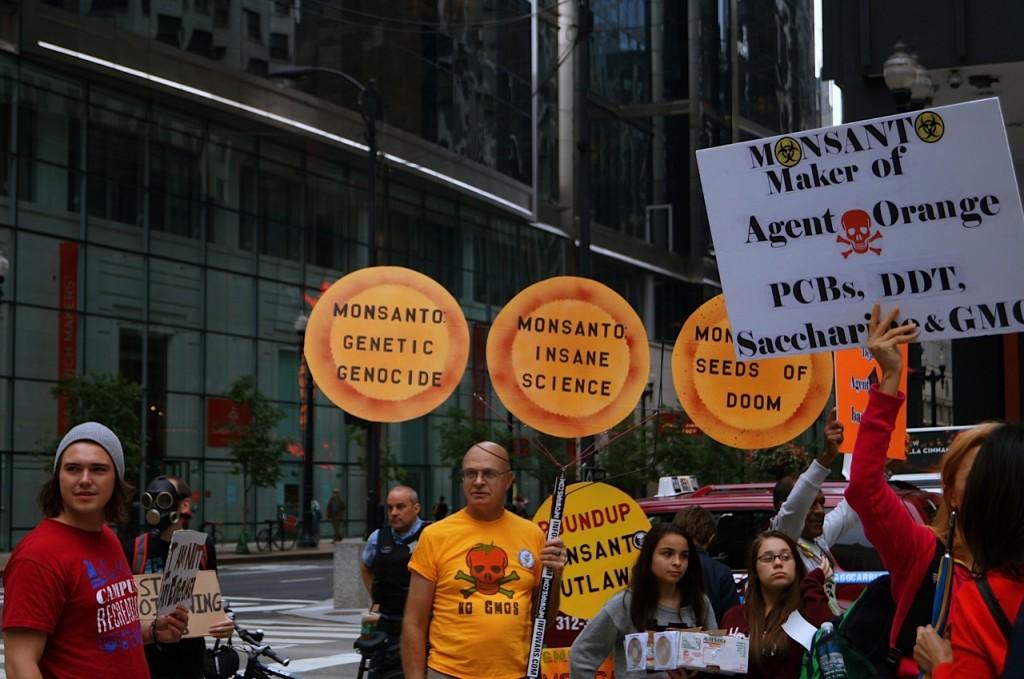Beyond a slender detachment in the field, where the water’s of a mellow brook run free and unbound, a farmer surveys the consummation of his efforts. Flush expanses of honeyed wheat stir in perfect symmetry, their faultless appearance in geometry and in quantity unequaled by his previous harvests. The air breathes in an illusive harmony, his passion falls to complacency.
March 27, 2013 heralded the dawn of a food revolution.
Few would argue that in terms of natural resources, we live in precarious times. As populations continue to rise and our ability to provide for this population remains inadequate, the question of sustainability prevails. Prominent biotech corporations such as Monsanto and DuPont endeavor to increase worldwide food production through the use of advanced plant breeding, biotechnology and improved farm management practices. According to their official webpage, Monsanto pledges to double yields of core crops by 2030 without compromising nutrition, a vision that, for many, is currently inconceivable.
In late March of 2013, President Obama approved federal spending bill H.R.933, which served to realign and reallocate government funds for the proximate fiscal year. Provided within its pages is the Farmers Assurance Provision, a bill that, in effect, disrobes the federal judiciary of the right to restrict the planting and sale of genetically modified seeds. Frequently labeled “The Monsanto Protection Act,” the courts would have no authority to act in response to consumer health concerns associated with the primary source of Monsanto’s livelihood: GMOs.
Genetically Modified Organisms (GMOs) are plants or animals whose essential genetic code has been manipulated with DNA from bacteria, viruses, or other organisms in order to achieve some enhanced trait. Many scientists now believe that altering the eugenics of the world food supply to a state of increased resilience and general production yield will put an end to global hunger. In affording the Monsanto conglomerate and others like it the liberty to grow and cultivate GM crops free of conventional regulation, President Obama and Congressional supporters place unprecedented confidence in the benefit of genetic modification and the ability of corporations to ensure its safety.
Despite hefty claims that the manufacturing of GM crops will boost per capita production and dissolve the global food crises, evidence exists to the contrary. Considered the most definitive study to date on GM crops and yield, the Union of Concerned Scientists’ 2009 report Failure to Yield concluded that “GMOs do not, on average, increase yields at all.”
The Monsanto legislation kindled immediate controversy. Representatives from the USDA and White House argued that the provision undermines the concept of judicial review and degrades the separation of powers between Congress and the judiciary, urging senate appropriations chair Barbara Mikulski (D-Maryland) to consider their opposition.
According to Senator Jon Tester (D-Montana), “Not only does (The Monsanto Protection Act) ignore the constitutional idea of separation of powers, but it also lets genetically modified crops take hold across this country, even when a judge finds it violates the law.”
This concept of unconstitutionality has generated significant debate, as many consider the court’s inherent power to check acts of Congress and preserve the public good an essential component to American liberty.
Anti-protection activists have also cited the fact that a number of government officials hold leverage in Monsanto. Former Monsanto VP and current Monsanto lobbyist Michael Taylor, for instance, was named to a high- level advisory position at the Food and Drug Administration (FDA) in January 2010. According to Global Research, “it is reasonable to assume that his advice to the FDA is focused upon helping his employer reduce its regulatory burden and improve its profitability.” Such a conflict of interest is particularly disconcerting when Monsanto entrusts the safety of its products to the same individuals who stand to benefit from its deregulation:
“Monsanto should not have to vouchsafe the safety of biotech food,” Phil Angell, Monsanto’s director of corporate communications told The New York Times. “Our interest is in selling as much of it as possible. Assuring its safety is the FDA’s job.”
Proponents of food safety laws have furthered the cause of discord, claiming that the ability to evade scientific and regulatory review jeopardizes consumer well- being. As researchers continue to explore the consequences of GM consumption, more and more evidence seems to provide a link between genetically modified foods and a myriad of adverse side effects.
In a two-year long study published on September 19 in Food and Chemical Toxicology, French scientists found that 50 percent of male rats and 70 percent of the female rats who had been fed a diet consisting of Monsanto maize died earlier than those who had been fed a natural alternative. It was also noted that those fed the GM corn began to develop large mammary tumors after the fourth month of the study, ultimately resulting in severe liver and kidney damage and crippling organ function.
The American Academy of Environmental Medicine (AAEM) encourages doctors to prescribe non-GMO diets for all their patients.
A vast majority of GM crops are genetically engineered to tolerate otherwise deadly amounts of toxic weed killer. Although this allows famers to rid their fields of undesirable plants without damaging the primary crop, it raises a concern over the toxicity of the final product and any health risk to the consumer.
Between 1996 and 2008, U.S. farmers sprayed an extra 383 million pounds of herbicide on GMOs, according to the Institute for Responsible Technology. Not only does the increase in pesticide use pollute the earth’s air and water supply, but it also has been attributed to the recent decline of species such as the monarch butterfly and honeybee.
Dr. John Fagan, a former genetic engineer who rejected $614,000 in grant money from the National Institutes of Health out of his concern for the safety and ethics of GMOs, feels that the science should not intervene in the world food supply: “Crop engineering as practiced today is a crude, imprecise, and outmoded technology. It can create unexpected toxins or allergens in foods and affect their nutritional value.”
Since its conception, Monsanto has reportedly filed 130 lawsuits against some 400 farmers and 50 small businesses. The biotech monolith aims to insure that individuals will have very little choice regarding the consumption of their products, forcing small famers out of business under the guise of “patent infringements.”
Oakhurst Dairy, a family farm owned and operated since 1921, responded to consumer demands to provide milk free of rBGH hormones, a growth steroid heavily produced by Monsanto and currently banned in every industrialized nation besides the U.S. The farm was brought under litigation by Monsanto in April 2007, who claimed that Oakhurst should not have the right to inform their customers that their dairy products do not contain the Monsanto chemical. Oakhurst is one among many who have struggled to maintain their independence in the face of corporate pressures.
Private farms, however, are not alone in their efforts; According to The Non-GMO Project, more than 60 countries, including Australia, Japan, and the European Union, currently place heavy restrictions on or outright ban the production and sale of GMOs. Following the bill’s approval, over 250,000 Americans signed a petition urging President Obama to review H.R.933 and to remove the Monsanto provision, which, according to Food Democracy Now!, was essentially ignored. As of today, millions of people across the globe have banded together in an effort to resist Monsanto and corporations like it and to inform the public of the dangers associated with genetically modified foods. Organizing anti-Monsanto Facebook groups and staging worldwide protests, activists hope to increase public awareness and to draw the attention of those in Washington who hold the power to make a change. Organic retailers such as Whole Foods, Trader Joe’s, and Safeway have taken initiative to label their products as “non-GMO,”, a practice that many believe ensures customers the freedom to deny the GM paradigm.
“I think it’s important that students recognize just how impactful their decisions are. If we, even in Libertyville, are able to project our dissatisfaction by choosing not to buy genetically modified foods, then we can make a difference; not only in our own lives, but in the lives of everyone who is affected by the dangers of this system,” said senior Peter Cline, March Against Monsanto attendee.








![Senior River Thompson joins the Jazz Ensemble by singing “That Old Black Magic” by Mercer and Arlen Arr. Mark Taylor, along with senior Annie Brody on guitar and junior Thomas Teixeira on bass, earning big applause. “[The concert had] great energy because it's the last [jazz concert] of the year,” Brody said.](https://www.lhsdoi.com/wp-content/uploads/2025/04/Eight-That-Old-Black-Magic-1200x800.jpg)
![Mr. Abullh Ali, manager/assistant, helps open Queen Yemeni Coffee in downtown Libertyville at 606 North Milwaukee Ave. With the help of employees such as manager and LHS senior Yousef Taha, they are able to bring the Yemeni and Ethiopian culture to Libertyville by using their Queen spices, cinnamon and cardamom in their drinks such as Adani Chai, which is inspired by Sheda, the Queen of Yemen and Ethiopia. “The history of our coffee [is] a long history and we believe that Yemen and Ethiopia started the coffee and we are bringing something unique to the community,” Mr. Ali said.](https://www.lhsdoi.com/wp-content/uploads/2025/04/Photo-1-1200x800.jpg)




